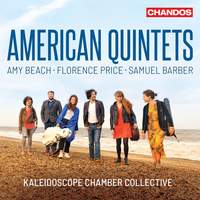Recording of the Week,
Chamber music from the Mendelssohns
Neither of the illustrious Mendelssohn siblings is remembered primarily as a chamber composer; Fanny, the elder, focused on Lieder and solo piano compositions, while Felix, the younger, additionally enjoyed success with symphonic and choral works. But as members of an enviably musical household (two brilliant pianists in Fanny and Felix, an accomplished singer in Rebecka and a no less proficient cellist in youngest brother Paul) it was inevitable that chamber music-making would feature in their upbringing and daily life, and inspire compositions from both composers. Today’s Recording of the Week shines a dual spotlight on some of the results, with chamber works from both of the elder Mendelssohn siblings performed by the members of the Kaleidoscope Chamber Collective.
 Felix’s early piano sextet has been described, not unreasonably, as a chamber concerto – the piano part, often antiphonal with the strings rather than interwoven with them, is the kind of brillante material that one might expect of an accomplished pianist filled with youthful excitement at what his contemporaries were doing with the instrument’s expanding capabilities.
Felix’s early piano sextet has been described, not unreasonably, as a chamber concerto – the piano part, often antiphonal with the strings rather than interwoven with them, is the kind of brillante material that one might expect of an accomplished pianist filled with youthful excitement at what his contemporaries were doing with the instrument’s expanding capabilities.
The “solo” material does not so much ripple as glitter, with the last movement especially energised by constant semiquavers that put Tom Poster through his paces. It’s a daunting challenge for the player, particularly coming from the pen of a fifteen-year-old boy. The wistful slow movement is a moment of sublime tranquillity that composers three times his age would struggle to match, with the muted sound of the string players in the distant key of F sharp major conjuring up a uniquely magical air.
Although it is a far later work, the placing of Fanny’s D minor piano trio immediately after Felix’s D major sextet gives the illusion of a pianistic competition between the siblings. As if establishing her superiority at the keyboard, the trio opens with torrents of notes for the pianist that far outstrip anything in her brother’s sextet, and yet – as with the later Rachmaninov concertos – must be kept in the background as an accompaniment to Elena Urioste and Laura van der Heijden’s string melody. No mean feat, particularly on a modern piano, but Poster shows no sign of difficulty in keeping this texture simmering.
Given her affinity for Lieder, perhaps it is no surprise that Fanny’s trio includes not just an Andante but a brief third movement entitled Lied. Despite its modest duration of just under two minutes, it’s a beautiful spin on the idea of the “song without words” (today associated largely with Felix) and draws from the players some of their most sensitive music-making. More than anywhere else in the work, in the Lied we hear Poster, Urioste and van der Heijden as three independent soloists.
After many years of having her compositions published by Felix on her behalf and her ambitions curtailed by her father, in the mid-1840s Fanny published three sets of vocal music in her own name. This move proved successful, and the trio seems to have been the first work she wrote specifically for publication in response. The sense of “what if…?” that accompanies any composer’s death in their prime is thus here compounded by the knowledge that when Fanny died in 1847 aged 41, shortly before the trio emerged in print, she finally stood on the verge of what should have been a trailblazing independent career.
Coming full circle back to the youthful days of the Mendelssohn household, Fanny’s piano quartet in A flat is, like Felix’s sextet, a teenaged work. It has an exploratory feel, both harmonically and structurally, and some soloistic passages for the violin that Urioste audibly revels in. No sooner had the seventeen-year-old Fanny started writing chamber music than she set about pushing the boundaries of what the forms were capable of. The final movement blossoms into a particularly surprising coda that closes the piece in a wholly unanticipated sixty-second blaze of glory.
The Kaleidoscope Chamber Collective continue to go from strength to strength. Their explorations of neglected repertoire from marginalised groups are not merely a much-needed contribution to the redressing of imbalances in familiarity and reputation – though they are certainly that – but they are also, quite simply, brilliant music-making.
Kaleidoscope Chamber Collective
Available Formats: CD, MP3, FLAC, Hi-Res FLAC
Kaleidoscope Chamber Collective
Available Formats: CD, MP3, FLAC, Hi-Res FLAC
Matthew Rose (bass), Kaleidoscope Chamber Collective
Available Formats: CD, MP3, FLAC, Hi-Res FLAC





